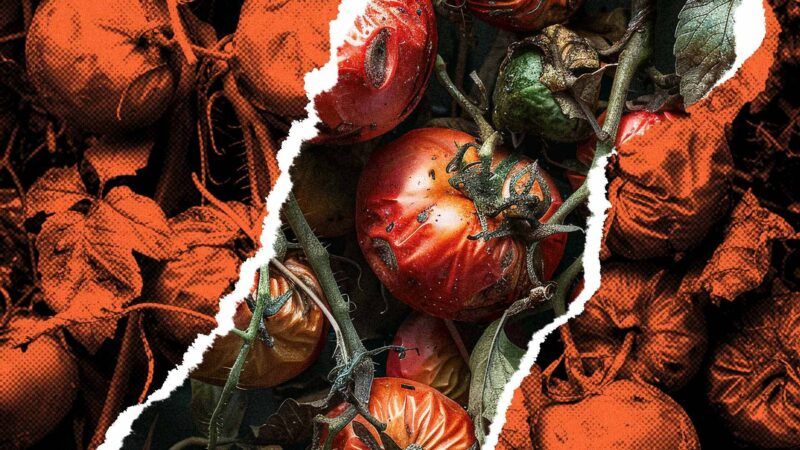Trump's Tariffs and Immigration Policies Destroy Thousands of Acres of Tomato Crops in Florida
“Between the cost of labor and the inputs that goes in, it’s more cost-effective for farmers” to plow over ripe tomatoes, said one expert.

Thousands of unharvested tomatoes are being plowed over in South Florida in a sign of what is to come under President Donald Trump's tariffs—or tariff threats—and immigration policies. Reporting by Miami's local Fox affiliate, WVSN, revealed that farmers are cutting their losses and letting crops go to waste due to increased picking and packing costs.
"You can't even afford to pick them right now," Heather Moehling, president of Miami-Dade County Farm Bureau, told WVSN. "Between the cost of labor and the inputs that goes in, it's more cost-effective for farmers to just plow them right now." Moehling said tomatoes are currently selling between $3 and $4 per box.*
But farmers need to sell a box of tomatoes for closer to $11 to break even, according to Tony DiMare, president of DiMare Homestead, which owns over 4,000 acres of tomato farms in Florida and California. American farmers haven't been able to out-compete cheaper Mexican tomatoes currently flooding the market, DiMare told WVSN.*
Even though the tariffs on Mexican imports never took effect for goods compliant with the United States-Mexico-Canada Agreement, including U.S. tomatoes, the threat of tariffs alone was enough to disrupt the U.S. market, DiMare told WVSN. "The Mexican industry exported, in some cases, double and triple the daily volumes to beat being subject to the 25 percent tariff in February and March and the 10 percent tariffs in April. That just devastated our markets in the U.S.," DiMare said.
To protect U.S. tomato farmers from the harm caused by tariff policies, Trump plans to impose an import duty of 20.91 percent on most tomato imports from Mexico starting in July. The action, which will end a 2019 trade agreement establishing a minimum price on Mexican imported tomatoes, is expected to drive up the cost of tomatoes for U.S. consumers, according to Michael Strain, a senior fellow at the American Enterprise Institute.
Other South Florida crops are also being impacted by the Trump administration's trade war. DiMare told WVSN that some Florida watermelon farmers are seeing their Canadian clients source their watermelons from Mexico to avoid Canada's retaliatory 25 percent tariff on American melons.
Labor is another concern: Immigration changes have driven pickers away. One homestead farmer, who chose to stay anonymous for fear of deportation, told WVSN: "A lot of people are really afraid and sometimes they come, sometimes they don't come, and the harvest is lost because it cannot be harvested, so that's why so much produce is lost."
The Trump administration is aware of the strain fluctuating policies are having on the nation's farmers. In April, U.S. Agriculture Secretary Brooke Rollins said her agency is preparing a contingency bailout plan for farmers should the trade wars continue to escalate. "We are working on that. We are preparing for it. We don't believe it will be necessary," said Rollins. She also noted the federal government gave $28 billion to farmers during Trump's first trade war.
While Trump is touting his recent deals with the United Kingdom and China as examples of how his trade policies are working, the Florida tomato industry serves as a real-world reminder that unpredictable policies can have far-reaching and unintended consequences on Americans' livelihoods. On some level, Trump knows this and has admitted that Americans will have to make do with less, despite being voted in to bring down the cost of living. The president's attempts at centralized planning will continue to drive prices up, and Americans will be the ones paying the price.
*CORRECTION: This article originally misstated the current cost of tomatoes and the amount that tomatoes need to be sold for farmers to break even.


Show Comments (101)